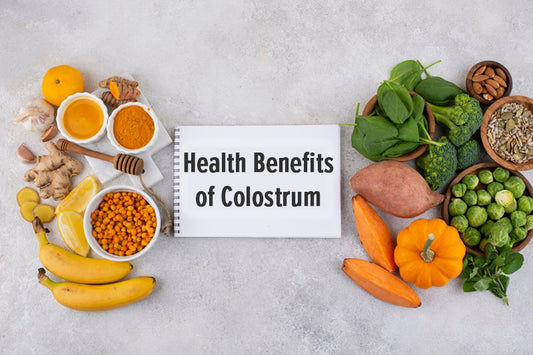Our gut health is seriously underrated—it's like the unsung hero of our wellness. I mean, think about it—the gut, our gastrointestinal (GI) tract, and digestive system does a ton of heavy lifting for our health. It's not just about breaking down food; it's about absorbing nutrients, getting rid of waste, supporting our immune system, and even playing a role in producing neurotransmitters that affect our mental health.
The key to a healthy gut lies in the balance of bacteria and other microorganisms living in our GI tract, collectively known as the gut microbiome. This bustling community of trillions of good bacteria, yeasts, fungi, and more plays a crucial role in keeping our gut in top-notch condition.
So, how do we give our gut the love it deserves? Well, it turns out there are some healthy habits that can set the tone for a healthy gut. Let's dive into habits that can make a real difference:
Hydrate Before Caffeine
Before you dive into that comforting cup of coffee, let's talk hydration. Water is the unsung hero of morning rituals. It balances electrolytes, aids digestion, helps disperse nutrients, and keeps our cardiovascular and immune systems in check. Plus, it's a crucial partner for your kidneys and liver in the waste elimination game.
So, before you reach for the coffee pot, make friends with a glass of water. Your gut and the rest of your body will thank you.
Balance Macronutrients in Breakfast
Let's talk breakfast—everyone's favorite meal, right? But here's the deal: a balanced breakfast sets the tone for the day. We're talking about a mix of carbohydrates, fats, and proteins, the nutrition's three musketeers.
A balanced blend means more energy throughout the day, fewer blood sugar spikes, and all-around benefits for your gut. Include goodies like avocados, eggs, and grass-fed butter for healthy fats.
Avoid Gut-Disrupting Foods
Some foods are like party crashers for your gut microbiome, disrupting the delicate balance and causing inflammation. Watch out for refined vegetable oils, pasteurized dairy, refined carbs, conventional meats, added sugars, and trans fats. They're troublemakers that can mess with your gut bacteria.
Add More Gut-Friendly Foods
Now, let's focus on the good stuff—foods that your gut loves. These foods that should be the base of your diet include:
- Fresh vegetables: Loaded with phytonutrients and includes cruciferous vegetables (broccoli, cabbage, cauliflower and kale), dark leafy greens (collard greens, kale, spinach), onions, peas, salad greens, sea vegetables and squashes.
- Whole pieces of fruit (not juice): Fruit contains various antioxidants like resveratrol and flavonoids, which are tied to gut health and beyond.
- Herbs, spices and teas: Turmeric, ginger, basil, oregano, thyme, etc., plus green tea and organic coffee in moderation.
- Probiotic foods: Try to include probiotic foods like yogurt, kombucha, kefir or cultured veggies in your diet daily.
- Wild-caught fish, cage-free eggs, and grass-fed/pasture-raised meat: Higher in omega-3 fatty acids than conventional farm-raised foods and great sources of protein, healthy fats, and essential nutrients like zinc, selenium and B vitamins.
- Healthy fats: Grass-fed butter, coconut oil, extra virgin olive oil, nuts/seeds.
- Ancient grains and legumes/beans: Best when sprouted and 100 percent unrefined/whole.
- Red wine and dark chocolate/cocoa in moderation: Several times per week or a small amount daily. Per day, no more than four ounces of wine or 1–2 squares of dark chocolate, ideally 71 percent cacao or higher.
Move The Body
Time to get those muscles moving! Studies show that regular exercise does wonders for your gut microbiome. Whether it's a morning walk, a yoga session, or hitting the gym, moving your body supports not only your gut health but your overall wellness.
In its optimal state, your gut serves as a robust powerhouse for a healthy immune system. Supporting the gut-brain connection helps keep your brain healthy. Additionally, it nourishes your body and removes toxins and waste. Try to include these habits in your daily routine to improve your gut health in the future.
Consider Supplements
Gut supplements help make a healthy gut environment by working together and taking care of it. Let's uncover the unique roles each supplement plays and how, together, they contribute to the holistic wellness of your digestive system.
- Prebiotics: Nurturing the Microbial Environment
When it comes to supplements, prebiotics play a vital role in nurturing the microbial garden within your gut. These non-digestible fibers serve as the perfect sustenance for beneficial microbes. Think of prebiotics as the gardeners, tending to the soil to ensure a flourishing environment for good bacteria. Incorporating prebiotic supplements into your routine provides targeted nourishment for the microbial ecosystem in your gut.
- Probiotics: Introducing the Microbial Support
Probiotic supplements are like recruiting a team of microbes to support your gut health. These live microorganisms, carefully selected for their beneficial properties, work in harmony to enhance digestion, fortify the immune system, and maintain a balanced gut microbiome. Choosing a high-quality probiotic supplement ensures a diverse and robust population of good bacteria, acting as supports in your quest for optimal gut health.
- Postbiotics: Harnessing the Aftermath
While postbiotics are often a natural byproduct of the fermentation process in food, supplements can also harness the power of these beneficial compounds. Postbiotic supplements contain the leftovers from the party of microbes, giving your gut the necessary substances for gut health. These supplements support the gut lining, regulate the immune system, and offer a convenient way to ensure your gut gains the benefits of postbiotics.
- Synergy in Supplementation: Balancing the Trio
The synergy between prebiotic, probiotic, and postbiotic supplements creates a holistic approach to gut health. By incorporating these supplements into your routine, you're actively nurturing a balanced and diverse gut ecosystem. It's like providing your gut with a comprehensive toolkit for optimal wellness.






